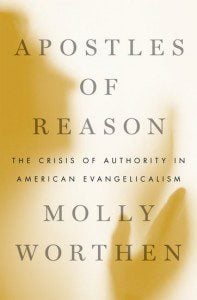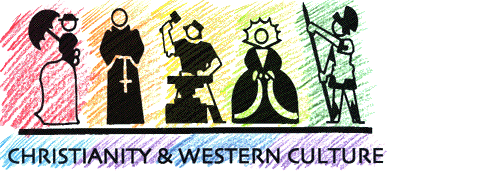It’s rare that those of us who teach the history of Christianity have our work celebrated at the largest gathering of Christian college leaders and administrators. Yet that’s what happened last Wednesday, when historian Molly Worthen used her plenary address at the Council for Christian Colleges and Universities (CCCU) International Forum to contend that “the study of Church history has ‘a huge role to play’ in the future of Christian higher education.”
That from an article in The Christian Post, which goes on to quote Worthen’s impression that
on many campuses, the quest for historical consciousness is experiencing a renaissance. There is a new generation of faculty and administrators who want to rid themselves of the long duree [sic] of Christian history and transmit a sense of that to their students… Students are hungry for it, especially the huge numbers that grew up in non-denominational or denominationally indifferent churches with a sort of applied myth that all there is to Christian history is Jesus and the Apostles, the papist dark ages, that Martin Luther guy, and the founding of their own church when [the pastor] started holding Bible studies in a living room over 20 years ago or whatever it might be.
 In part, Worthen framed this hunger as a response of discontented young evangelicals craving historical roots older than the pro-Trump religious right. As she did in her acclaimed book, Apostles of Reason, Worthen described evangelicalism as a diverse movement, with a “longer, much more complicated history” than that undergirding, say, John Fea’s “court evangelicals.”
In part, Worthen framed this hunger as a response of discontented young evangelicals craving historical roots older than the pro-Trump religious right. As she did in her acclaimed book, Apostles of Reason, Worthen described evangelicalism as a diverse movement, with a “longer, much more complicated history” than that undergirding, say, John Fea’s “court evangelicals.”
As someone who has taught history in a CCCU school for fifteen years, I’m going to join John in being skeptical of the desire of my students to better understand the history of American evangelicalism. Not only for the reasons that John shared at his blog, but because so few of my students identify with evangelicalism. We draw a lot of conservative Lutherans and a few Catholics, Methodists, and Presbyterians, plus megachurch kids who don’t even realize that they’re associated with the Baptist denomination that sponsors Bethel — let alone some larger movement called “evangelicalism.”
But I do think Worthen is on to something here in detecting a revived “quest for historical consciousness” among undergraduates. It might even be true that young adults are choosing Christian colleges for different reasons than did their parents and grandparents:
The thing they seek more than anything and the thing that causes them anxiety is not really a quest for the perfect, watertight, rational case for believing the Bible. Certainly, there are some students who are preoccupied with these traditional questions of apologetics… I think the thing they really crave — and it’s the same thing most of my students at [University of North] Carolina crave — is a sense of authenticity, a sense of knowing who they truly are in the world, of being part of a human and humane community that is rooted in place and time and can occasionally persuade them to put down their smartphones and interact as real, living, breathing individuals.
"Students crave a sense of knowing who they are…of being part of a human and humane community… You can give them a sense of where they stand in the broad sweep of Christianity." @MollyWorthen#CCCUForum
— CCCU (@cccuorg) January 31, 2018
Now, if you asked my incoming students what “thing they seek more than anything” from their Christian college experience, most would answer, “a job.” (Or maybe, “a spouse.”) But that’s because that’s what they’ve been trained to say — by our own marketing and recruitment folks as much as by their parents and the media.
But if you peel back such anxieties, I’ve often found a deeper longing, much more like what Worthen describes. And church history can help to satisfy that desire.
I won’t pretend that most Bethel students are thrilled that they’re required to take the multidisciplinary church history course that I coordinate and help teach: Christianity and Western Culture. I’m sure most are happy just to be done with a course as demanding as CWC.
But at some point in every semester it’s taught, I’m sure every CWC student experiences the sensation of glimpsing herself in the distant mirror of church history. She hears a lecture or reads a primary source and recognizes that the way she thinks about God, about herself, about America and the world, and about justice, beauty, and the good life is rooted in history. That her Christian story is bound up with earlier Christian stories.
That, for better and worse, who she is as a follower of Christ has been shaped by the past. For she comes to see that she is not alone in time, but a part of a centuries-old community of faith that is composed of a great cloud of witnesses, living and dead. She finds kinship with what one of my colleagues yesterday called a “lineage of sojourners” (in an opening reflection on Psalm 39:12).
In fact, one of our stated curricular goals is that students will learn to “examine personal faith within the broader Christian tradition.” So the last question on the last test they take asks each student, “Where have you most clearly seen your personal story start to intersect with the story of Christianity and Western culture?” Most often, they pick one of the Reformers: Luther, Calvin, or Menno Simons for our Protestants; Erasmus, Ignatius Loyola, or Teresa of Avila for our Catholics. (Or, because it’s Bethel — and perhaps because it’s me teaching the course — they identify with German Pietists like Philipp Spener and Johanna Eleonora Petersen and their attempts to revive and revise the earlier reformation.) For many of our growing number of STEM majors, it’s a scientist like Galileo or Pascal; such students recognize in those Christian thinkers the struggle of balancing faith and reason in a world that increasingly pits science and religion against each other. Others look beyond church history proper to reflect on the significance of a critic like Immanuel Kant, whose dare “to know” minus the guidance of religious tradition or authority appeals to at least a few young Christians exhilarated to experiment with the intellectual openness of a college education.
As far as our course goes, I think Bethel is actually doing pretty well by Worthen. But CWC is tasked with ending around 1800, leaving subsequent general education categories to explore the 19th, 20th, and 21st centuries. Some of those courses do continue to expose students to church history. For example, students who meet their Contemporary Western Life and Thought requirement in my World War I or World War II courses will reflect at some length on Christian responses to war and genocide — and on the way that modern warfare has reshaped Christian churches. But that’s not a common necessary feature of that gen ed category. And it’s certainly possible that even an avowedly evangelical student at Bethel could graduate without having encountered anything more of the history of evangelicalism than what we do in CWC with John Wesley, George Whitefield, Jonathan Edwards, and their Puritan and Pietist forerunners.
Meanwhile, anyone fulfilling their World Cultures requirement by taking Latin American Civilizations with my colleague Ruben Rivera is bound to learn about the development of Catholicism and then Pentecostalism in that part of the world. (Ruben also teaches a Hispanic Christianity course in that category for which students join a local Spanish- or Portuguese-speaking faith community for the semester.) But they could complete the same requirement by taking History of Islam with my friend Amy Poppinga — and I would hardly expect her to center church history in that class. And the majority of courses in that category are taught by social scientists who aren’t necessarily focused on religion as a category of study. So I’m sure many of our students graduate without learning about the growth of their religion in the Global South.
So is Bethel typical — either in giving 18-year olds a chance to find themselves in an older Christian story, or in allowing them to neglect more recent developments in the history of Christianity as they continue their undergraduate studies? I’ll leave it to someone else to riffle through 120-some catalogs to see how church history figures into CCCU curricula. But I did take a look at the country’s largest Christian university (albeit not a member of the CCCU).
Undergraduates at Liberty University must take a Western Civ or U.S. history survey as part of their general education core competency requirements. It may be that church history plays a leading role in all of those courses. But as far as I can tell from Liberty’s online catalog, it does not feature in the multi-course Christian Life & Thought Sequence, which includes classes on the Old and New Testaments, contemporary moral issues as seen from a “biblical worldview,” systematic theology, and evangelism. The only “history” course in that sequence is one on the History of Life, which presents “evidence and arguments for creation and against evolution.”
That’s a topic for another blog post. But it is interesting that Liberty seems to have centered its curriculum on the “traditional questions of apologetics” that Worthen thinks are being superseded by a desire for “authenticity, a sense of knowing who they truly are in the world, of being part of a human and humane community that is rooted in place and time….”













